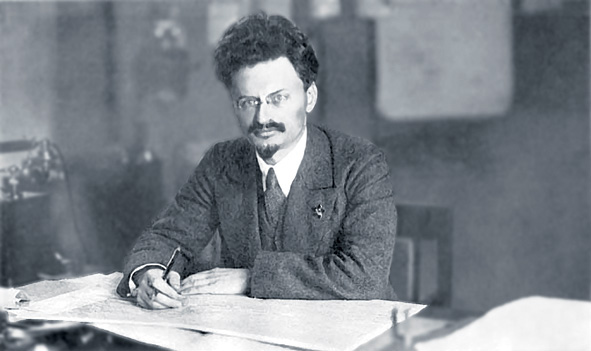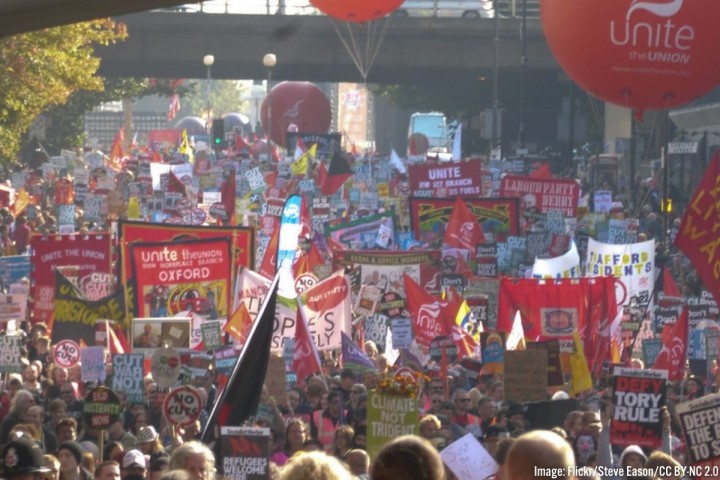The latest issue of our theoretical journal, In Defence of Marxism, is available for pre-order! The four articles contained in this fantastic new edition defend the ideas of the Enlightenment, and rational thought: debunking the pseudo-Marxist Frankfurt School, discussing the implications of new images of the cosmos from the James Webb telescope, exploring the life and ideas of Spinoza, and reviewing James Joyce’s classic novel Ulysses. We publish here Alan Woods’ editorial (written in September), which describes the total irrationality of capitalism in its present state of senile decay.
During the hot, sticky summer months, one frequently witnesses a phenomenon known as ‘heat lightning’. It has been particularly noticeable this year, which has brought unusually high temperatures to normally moderate climes, like that of the British Isles.
At such times, the atmosphere is charged with electricity and the humid air becomes almost unbreathable. On warm, humid nights, the sky seems to flicker with light; and even on a seemingly clear night with stars, you may see flashes. You await the approaching sound of thunder. Yet no sound accompanies the flash.
The electric charge is gradually building up, but has not yet reached that critical point when the storm finally breaks, unleashing all its pent-up fury. Heat lightning is therefore not yet a storm. But it is always the silent herald that announces that a storm is imminent.
There is an exact parallel between this natural phenomenon and the class struggle. Everywhere you look, the sensation is growing that a storm is approaching, and approaching fast. The contradictions in society are producing tensions that are increasingly unbearable.
The stagnant air of what passes for political life has become unbreathable for the great majority of people, who see that their feelings of desperation find no reflection in any of the existing parties or institutions. The conviction grows stronger with every passing day that the present situation is utterly intolerable. Sooner or later, something has to give.
The psychology of the masses
The main feature of the present world situation is that the rhythm of history has been enormously accelerated. However, human consciousness is very conservative. It always lags behind objective events.
This innate conservatism does not welcome change – still less violent, revolutionary change. On the contrary, it fears it and will resist it until objective conditions make it impossible to resist any further. But in order to overcome the powerful force of inertia and bring about such a dramatic change in consciousness, a series of tremendous shocks will be necessary.
 The level of radicalisation in the working class depends on a whole series of factors, as Trotsky explained in his article The Third Period of the Comintern’s Errors / Image: Public Domain
The level of radicalisation in the working class depends on a whole series of factors, as Trotsky explained in his article The Third Period of the Comintern’s Errors / Image: Public Domain
In 1938, Trotsky wrote: “Objectively speaking, the conditions for world Socialist revolution are not only ripe and mature, but they’re rotten ripe!” That is clear to the Marxists right now, but it is not necessarily clear to the masses in the advanced capitalist countries.
The level of radicalisation in the working class depends on a whole series of factors, including the period that precedes a slump. Trotsky explained this very clearly in his brilliant article, The Third Period of the Comintern’s Errors, in which he sharply criticised the idea put forward by the Stalinists in the notorious ‘Third Period’, and which is still repeated by some foolish ultra-lefts today, that the masses are always ready to revolt, and that it is only the conservative bureaucratic apparatuses that prevents them from doing so.
Trotsky pours scorn on this idea and it is worth quoting his words at length:
“The radicalisation of the masses is described as a continuous process: today, the masses are more revolutionary than they were yesterday, and tomorrow will be more revolutionary than today. Such a mechanical idea does not correspond to the real process of development of the proletariat or of capitalist society as a whole.
“The social democratic parties, especially before the war, had imagined the future as a continual increase in the social democratic vote, which would grow systematically until the very moment of taking power. For a vulgar or pseudo-revolutionary, this perspective still essentially retains its force, only instead of a continual increase in the number of votes, he talks of the continual radicalisation of the masses. The mechanical conception is sanctioned also by the Bukharin-Stalin programme of the Comintern.
“It goes without saying that from the point of view of our epoch as a whole the development of the proletariat advances in the direction of the revolution. But this is not a steady progression, any more than the objective process of the deepening of capitalist contradictions. The reformists see only the ups of the capitalist road. The formal ‘revolutionaries’ see only its downs. But a Marxist sees the road as a whole, all of its conjunctural ups and downs, without for a moment losing sight of its main direction – the catastrophe of wars, the explosion of revolutions.
“The political mood of the proletariat does not change automatically in one and the same direction. The upturns in the class struggle are followed by downturns, the floodtides by ebbs, depending upon complicated combinations of material and ideological conditions, national and international. An upsurge of the masses, if not utilised at the right moment or misused, reverses itself and ebbs into a period of decline, from which the masses recover, faster or slower, under the influence of new objective stimuli.
“Our epoch is characterised by exceptionally sharp periodic fluctuations, by extraordinarily abrupt turns in the situation, and this places on the leadership unusual obligations in the matter of a correct orientation.
“The activity of the masses, properly understood, expresses itself in different ways, depending upon different conditions. The masses may, at certain periods, be completely absorbed in economic struggles and show very little interest in political questions. Or, suffering a series of defeats in economic struggles, the masses may abruptly turn their attention to politics. Then – depending upon the concrete circumstances and the past experience of the masses – their political activity may go in the direction of either purely parliamentary or extra-parliamentary struggle.” (Writings, 1930, p. 28)
These lines are extremely important because they show that from general statements about the epoch it is impossible to deduce the stage in which the consciousness of the proletariat finds itself, or the concrete movement of the class. We see here very clearly the method of Trotsky, which does not proceed from abstract formulae (‘the new Epoch’) but from concrete facts.
On 15 November 1857, Engels complained in a letter to Marx: “The masses must have got damned lethargic after such long prosperity.” And he added: “Chronic pressure is necessary for a while in order to warm up the populations. The proletariat will then strike better, with better consciousness of its cause and more unity…”
These words retain their full force today. The psychology of the masses is conditioned by the whole period of past decades. In the advanced capitalist countries, the workers became accustomed to a reasonable standard of living, a functioning health service and pensions after retirement. All these things were taken for granted; they seemed to be fixed for all time, a normal state of affairs.
In reality, however, they were not normal at all, but a historical anomaly. What we are witnessing is merely the inevitable process whereby the capitalist system is returning to its normal state of affairs, which is far more similar to the conditions that existed in the 1930s than during the economic upswing that followed the Second World War.
Now the working class faces a ‘new normality’, which has nothing in common with what went before. Yes, indeed! Severe shocks will be necessary to shake them out of the old inertia. But these shocks are already occurring.
The example of Britain is very clear in that respect. From being what used to be seen as the most politically stable and conservative country in Europe, it has now become one of the most unstable and turbulent. And the root cause of this dramatic change is to be found in economic factors.
The cost-of-living crisis
All of a sudden, the old voices of confidence and optimism have fallen silent. In recent months, even the most-cursory glance at the pages of the financial press shows that the strategists of Capital are filled with dark foreboding. The centre of attention has shifted to the price of energy, which is soaring to unprecedented levels.
Global oil prices are nearly twice their level in January 2021. But the situation with natural gas prices is far worse. British and European wholesale natural gas prices are already trading at close to 10 times normal levels. A phrase that is now constantly repeated, and which neatly sums up the fears of the bourgeois is ‘the cost-of-living crisis’. This is the most obvious sign of the organic crisis of capitalism.
By October, a household in Britain will be paying more than £3,500 ($4,200) a year for energy, more than three times last year’s bill. But some experts are warning that typical gas and electricity bills could rise to more than £7,000 a year in 2023. And a new estimate by Goldman Sachs predicts that inflation in Britain will rise to 22.4 percent next year.
Many families here are already being forced to choose between heating their homes or feeding their children. This has given rise to fear among millions of families, including those who are working and even layers of the middle class.
Important changes in mass consciousness are already evident in small things. In the pubs and bus stops, where the main topic of conversation was always the weather or football, all the talk is now of the cost of living: people are no longer confident that they will be able to pay their bills and feed their families. There is a general feeling of anxiety, which is rapidly being transformed into anger.
This is what Trotsky, in a brilliant phrase, called the molecular process of revolution. It is the precise equivalent of the gradual accumulation of electrical charge that precedes a storm. It is the political equivalent of heat lightning.
A winter of discontent
A wave of strikes is already sweeping Britain. The militant railway workers have led the way, followed by others, from dock workers and communication workers, to criminal lawyers.
 A wave of trade union militancy is sweeping across Britain / Image: Steve Eason
A wave of trade union militancy is sweeping across Britain / Image: Steve Eason
1,900 dockworkers at Felixstowe, Britain’s biggest port, staged an eight-day stoppage, which caused severe problems for the delivery of goods to businesses and supermarkets. Now more strikes are scheduled, or likely to be approved by teachers, civil servants and nurses and others.
As the anger of workers grows more intense, right-wing union officials are starting to feel the fire under their backsides. Traditionally ‘moderate’ unions, like the GMB, with more than half a million members nationally, are set to ballot more than 100,000 local government workers over their pay deal.
In Scotland, the bin men have already walked out, leaving cities like Edinburgh sinking under a mountain of garbage, which has offended the nostrils of the many unsuspecting tourists who had come to the Scottish capital to experience the world of culture in the city’s celebrated Festival, but instead were confronted by a world of stinking trash and well-fed rats.
As I write these lines, I see that the refuse workers have just been offered a new pay rise and the union leaders are urging acceptance, so by the time you read this, the strike will almost certainly be over. But the fumes of rotting rubbish will hang around for some time, providing a most appropriate metaphor for the true relationship between culture and a decaying social system.
New layers are increasingly being drawn into the struggle. Even the traditionally non-militant Royal College of Nursing (RCN) is preparing to consult its members on whether they would be prepared to take strike action. Even more surprising are the scenes of criminal lawyers, complete with black robes and white wigs, standing on picket lines, chanting slogans and demonstrating against the government.
What is impressive is the degree of public support for the strikes. The attempts of the Tory government and its hired media to whip up feelings against the rail strike among frustrated travellers have failed. Almost all those interviewed expressed sympathy and support for the strikers.
In response to government plans to cut 91,000 civil service jobs, the Public and Commercial Services Union (PCS) calls on the Trades Union Congress (TUC) to “support industrial action aimed at preventing job cuts and coordinate such action with other unions in dispute where possible.”
While everybody is trying to avoid the words ‘general strike’, the idea that it is necessary to link up the different workers on strike is becoming ever more evident. The movement in the direction of a general strike is gathering more momentum every day.
The Tory Party
In their recent public utterances, even right-wing trade union leaders may hint at the idea of a general strike. But in reality, they are terrified of it, because it would pose the danger of losing control of their rank and file. These hints are intended to frighten the government into making concessions that would render any serious action unnecessary.
 Britain's new prime minister Liz Truss speaks in the language of open class war / Image: UK Gov Flickr
Britain's new prime minister Liz Truss speaks in the language of open class war / Image: UK Gov Flickr
Unfortunately for them, Britain has a new prime minister. Though the UK is supposed to be a democracy, it is worth noting that Liz Truss was elevated to office, like her two Tory predecessors, without most of the voting public even having a say.
This means that the Tory Party is now led by its most ignorant and short-sighted faction. The new Tory leader thinks she can defeat the unions, just as Margaret Thatcher defeated the miners. She speaks in the language of open class war.
All this is music to the ears of the shopkeepers, stock market swindlers, estate agents, retired army colonels, second-hand car dealers, and similar parasites and social undesirables who make up the base of the Tory Party today.
But their grasp on reality is virtually non-existent. Her threats to limit the right to strike has not succeeded in intimidating the unions. On the contrary, they have fuelled the general sense of anger and injustice. The new Unite general secretary, Sharon Graham, head of a union with 1.4 million members, responded by warning:
“If you force our legitimate activities outside of the law, then don’t expect us to play by the rules.”
In other words: don’t push us to the point where we will have no alternative but to call a general strike.
Those Tory ministers who still possess a glimmer of intelligence will have been alarmed at the extent of potential strike action, reflected in motions to the annual conference of the TUC. They have obviously been pressing Ms. Truss to take steps to soften the blow of the rising cost of energy.
Thus, Ms. Truss has been forced, reluctantly, to take measures to cancel or blunt the rises for fear of the social and political consequences. No sooner had she stepped over the threshold of Number 10 Downing Street than she announced plans to freeze energy bills at an average of £2,500 a year for two years. But since the current price cap already represents a huge 54 percent increase, setting the cap at £2,500 is not a freeze but a huge increase, which many people are already unable to pay.
And the key question is: who will pay the cost of freezing prices? Truss has brazenly refused to introduce a windfall tax on the obscene profits of the energy companies. The money will have to be borrowed. But by borrowing enormous amounts of money at a time when interest rates are rising, the government will soon find itself in trouble. The national debt – which is already huge – will surge to new levels of unsustainability.
Since the borrowed money will have to be paid back from taxation, this plan involves a massive transfer of wealth – £150bn or more – in taxpayer funds to energy suppliers. That means that in the months and years ahead, households and businesses will be punished with higher bills, higher interest rates and higher mortgage costs, as well as deep cuts to vital public services.
In other words, these measures will only serve to pile up new contradictions. The UK was lurching unstoppably in the direction of a slump, which all the economists agree will be the worst of all the G20 economies, apart from Russia. Britain will find itself in the worst of all worlds: a deep economic crisis together with spiralling inflation.
Thus, whatever Ms. Truss does now will be wrong.
The gathering storm
The problem that faces Britain and every other country is simply stated. The ruling class has no alternative but to place the whole burden of the crisis on the shoulders of the working class. But the workers cannot afford that to happen.
Will the contradictions in Britain lead to a general strike? It is not possible to provide a definite answer to this question. It depends on a concatenation of circumstances that are impossible to predict. The TUC leaders would never willingly go down the road of a general strike. But that decision may not be entirely in their hands.
In 1972, the then-Tory government and the TUC almost stumbled into one, which was not of their choosing. Something like this could very much happen again. One thing is very clear. The contradictions that have been piling up over a long period are now approaching the critical point where quantity becomes transformed into quality.
It is possible to measure the degrees of heat and cold with the aid of a thermometer. Unfortunately, no such instrument has yet been invented to measure the degree of anger and discontent of the masses. But the consciousness of the masses is being forged by the hammer blows of events.
The stage is set for an unprecedented explosion of the class struggle, not only in Britain but in other countries in Europe – France, Germany and Italy, to look no further. Insurrectionary situations can erupt like a thunderbolt from a clear blue sky. We saw this very clearly in the case of Sri Lanka.
The storm that was so clearly announced in the summer is about to break.
Watch this space!

